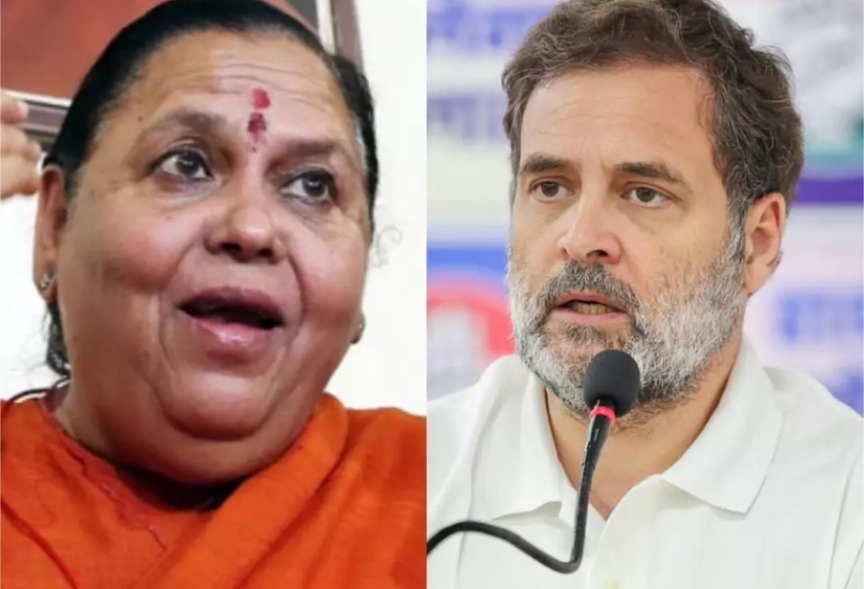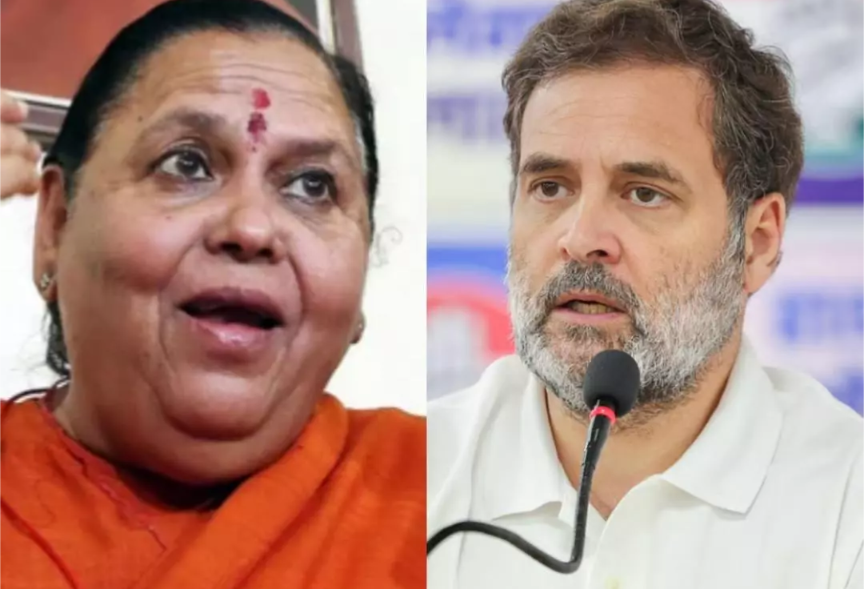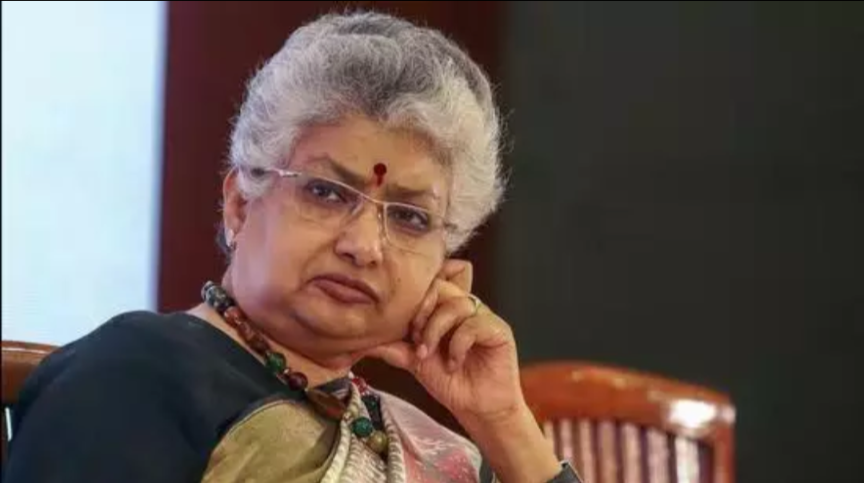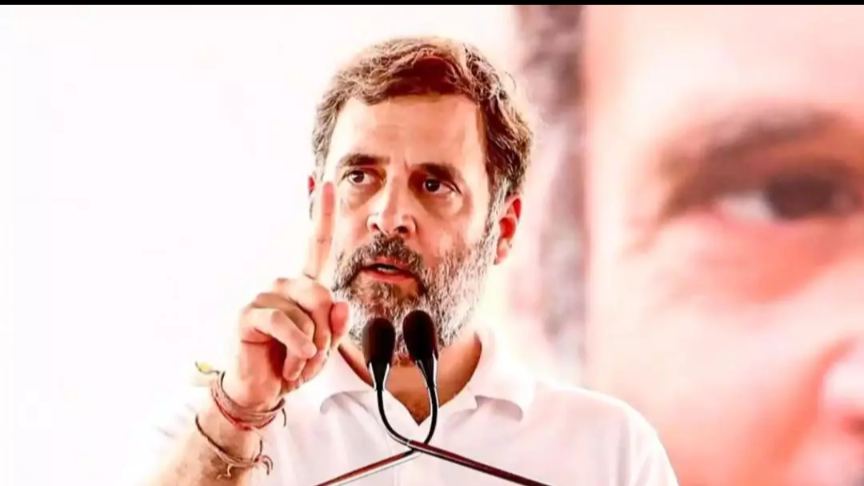Uma Bharti hits back at Rahul Gandhi’s ‘vote theft’ claims, saying he should take homeopathic medicine for peace. Read the full political exchange.

Introduction
Indian politics is no stranger to sharp exchanges, colorful language, and strong rhetoric. Over the decades, leaders across party lines have relied on witty jibes and biting sarcasm to corner their rivals. The latest controversy stems from comments made by senior Bharatiya Janata Party (BJP) leader and former Union Minister Uma Bharti, who suggested that Congress leader Rahul Gandhi should “take homeopathic medicine” to cure his obsession with alleged “vote theft.”
This remark has sparked fresh political debate, with supporters and critics weighing in on whether such rhetoric trivializes serious issues like electoral transparency. To understand the depth of this spat, one must explore not just the political history between the BJP and the Congress, but also the broader context of electoral reforms, Rahul Gandhi’s repeated accusations, and the BJP’s strategy to discredit him.
For related political clashes, see Trump Wanted Nobel Nomination from PM Modi, Denied India-Pak Conflict Role, Murder Case Filed Under BNS for Killing of Kalkaji Temple Sewadar, and Mass Evacuation of Gaza Impossible: Red Cross Amid Israeli Attack.
Rahul Gandhi’s Allegations of “Vote Theft”
Rahul Gandhi’s Persistent Claims
For years, Rahul Gandhi has consistently accused the BJP of manipulating elections, either through the misuse of electronic voting machines (EVMs), influence over institutions, or alleged coercion of voters. These allegations are not new. In fact, they have become a recurring theme in his public addresses, particularly after the Congress suffered heavy defeats in the 2014 and 2019 Lok Sabha elections.
Evidence and Counterarguments
While Rahul Gandhi frequently raises the issue, his party has often struggled to provide verifiable evidence of large-scale manipulation. Independent bodies such as the Election Commission of India (ECI) and international observers have largely maintained that Indian elections remain free and fair. Critics argue that without substantive proof, Gandhi’s accusations weaken his credibility, giving opponents ample ammunition to dismiss him.
Resonance Among Supporters
That said, Gandhi’s rhetoric does strike a chord among certain segments of voters who feel alienated or distrustful of the system. His framing of elections as a battle between democracy and authoritarianism appeals to those who perceive the BJP as concentrating too much power.
Uma Bharti’s Counterattack
The “Homeopathic Medicine” Remark
Uma Bharti’s statement, urging Rahul Gandhi to “take homeopathic medicine” for his obsession, is a sarcastic jab implying that Gandhi’s repeated claims are more of a psychological fixation than a substantive political argument. In her view, the Congress leader’s rhetoric borders on paranoia and undermines his ability to present himself as a credible national alternative.
Political Calculations Behind the Statement
Bharti’s remark is not just about mockery—it is a calculated move to frame Rahul Gandhi as unserious, someone who indulges in complaints rather than constructive politics. By reducing his criticism to something that requires medical treatment, the BJP positions Gandhi as irrelevant in policy debates.
Reactions Within BJP and Congress
Predictably, BJP supporters amplified the remark, sharing memes and soundbites across social media platforms. Congress leaders, however, condemned the comment as an insult not just to Rahul Gandhi but also to voters who worry about the integrity of the democratic process.
History of Political Jibes in India
Legacy of Sharp Tongues
India’s political history is filled with memorable one-liners and verbal spats. From Indira Gandhi’s “Garibi Hatao” slogan to Atal Bihari Vajpayee’s poetic jibes at opponents, rhetoric has always played a central role in shaping narratives.
Rahul Gandhi as a Frequent Target
Rahul Gandhi, in particular, has often been at the receiving end of mockery. BJP leaders have referred to him as “Pappu” in the past, a derogatory nickname suggesting immaturity. Each election season, his speeches and statements are dissected not just for content but also for opportunities to ridicule.
Congress’ Own Attacks
It would be unfair to suggest that Congress leaders avoid such tactics. From calling Narendra Modi a “chaiwala” during the 2014 campaign to making remarks about the BJP’s ties with industrialists, Congress has also played the game of rhetorical attacks.
The Role of Media and Social Media
Amplification of Political Statements
In the age of digital communication, even a throwaway remark can dominate the news cycle for days. Media outlets thrive on soundbites, and Bharti’s “homeopathy” comment was tailor-made for headlines.
Meme Culture and Viral Trends
Social media platforms, particularly X (formerly Twitter), Instagram, and WhatsApp, amplified the remark through memes, GIFs, and short videos. Such viral content often overshadows detailed policy discussions, making politics more about perception than substance.
The Risk of Oversimplification
While viral jibes engage audiences, they can trivialize serious debates. Rahul Gandhi’s concerns about electoral integrity deserve scrutiny, yet they are overshadowed when reduced to a battle of witty comebacks.
Broader Political Context
Congress’ Struggles
The Congress Party has struggled to reinvent itself in the last decade. Despite Rahul Gandhi’s attempts to rebrand the party as a defender of democracy and inclusivity, the electoral results have been disappointing.
BJP’s Strategy
For the BJP, the goal is clear: keep Gandhi on the defensive, discredit his arguments, and prevent him from building momentum. Leaders like Uma Bharti are adept at delivering sharp remarks that dominate the narrative.
Electoral Stakes
With upcoming state elections and the 2024 Lok Sabha elections in the backdrop, every statement is calculated to influence voter perception.
The Homeopathy Angle
Why Homeopathy?
Choosing “homeopathic medicine” as the metaphor was not accidental. Homeopathy in India carries mixed connotations—while millions rely on it, many dismiss it as pseudoscience. By using this analogy, Bharti suggested that Gandhi’s problem is not serious enough for mainstream treatment, but rather a “frivolous obsession.”
Symbolism in Political Language
Such analogies shape public perception subtly. Instead of debating whether vote theft is real, the discussion shifts to whether Gandhi is delusional. This benefits the BJP’s communication strategy immensely.
Reactions from Analysts and Civil Society
Political Analysts’ Views
Several political commentators noted that Bharti’s remark is an extension of the BJP’s long-term strategy of ridiculing Rahul Gandhi rather than engaging with his points. They argue that while effective in the short term, such tactics risk turning political discourse into mere entertainment.
Civil Society Concerns
Civil rights activists express worry that such exchanges distract from genuine concerns about electoral reforms. They argue that both ruling and opposition parties should prioritize strengthening institutions rather than trading barbs.
Public Perception
Among ordinary citizens, reactions are divided. BJP supporters see the remark as humorous truth-telling, while Congress sympathizers view it as evidence of the ruling party’s arrogance.
Conclusion
Uma Bharti’s quip about Rahul Gandhi needing “homeopathic medicine” encapsulates the current state of Indian politics: sharp, performative, and designed for headlines. While such rhetoric entertains and energizes party bases, it risks overshadowing serious policy debates about electoral transparency, democratic accountability, and governance.
Rahul Gandhi’s insistence on raising concerns about “vote theft” speaks to a broader anxiety among opposition parties in a political system dominated by the BJP. Yet unless these concerns are substantiated with hard evidence, they will continue to be dismissed through clever jibes like Bharti’s.
In the long run, Indian democracy deserves more than sarcastic exchanges—it deserves meaningful engagement with issues that affect millions of voters.
For more on India’s political flashpoints, read Trump Wanted Nobel Nomination from PM Modi, Denied India-Pak Conflict Role, Murder Case Filed Under BNS for Killing of Kalkaji Temple Sewadar, and Mass Evacuation of Gaza Impossible: Red Cross Amid Israeli Attack.



